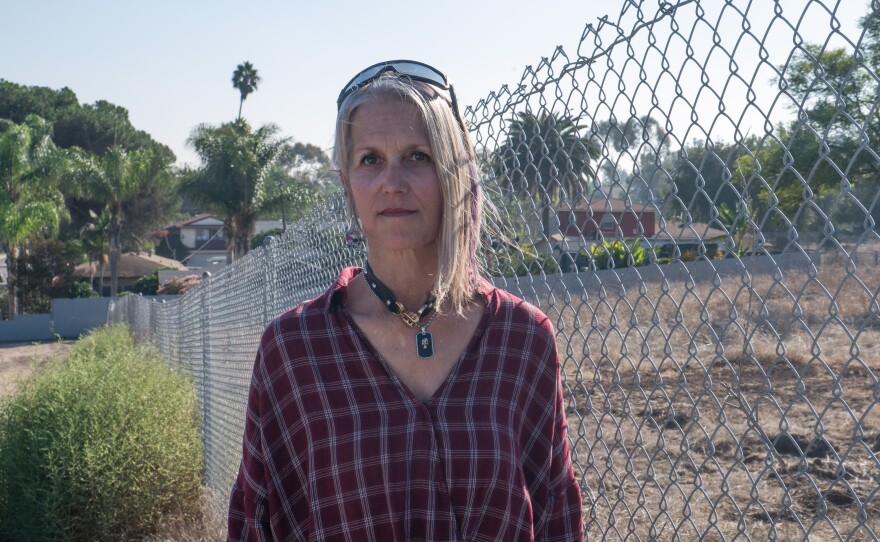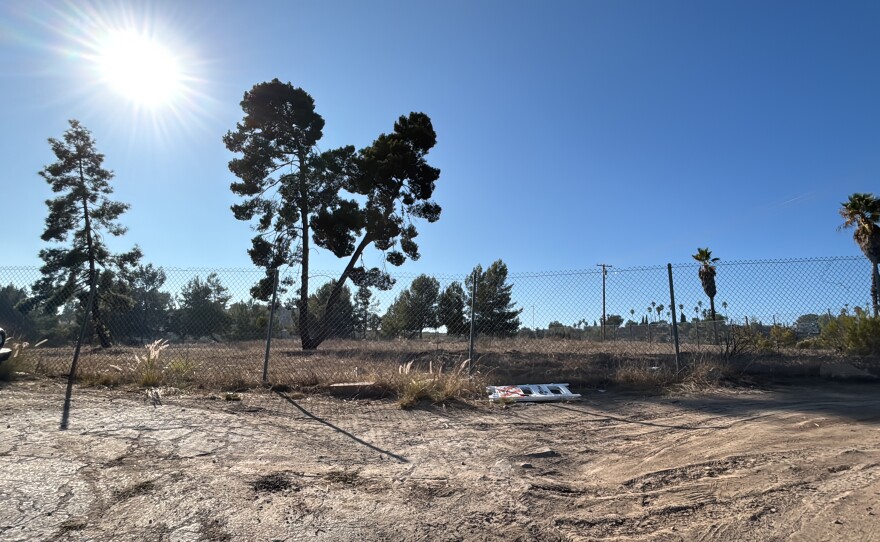Right now, it’s just an empty Caltrans lot on the corner of Troy Street and Sweetwater Road in Lemon Grove. Drivers zoom past, paying little attention to the fenced space.
But it could end up being a lot more.
The county wants to build 60 small cabins that could shelter people who are experiencing homelessness. The site would also offer hygiene facilities, case management and services to help residents move toward permanent housing.
Late last month, San Diego County Board of Supervisors authorized negotiations with Caltrans to buy the land.
Supervisors have allocated roughly $11 million for the project, with about $2 million going toward the purchase of the land from Caltrans.
Supporters of the project include Supervisor Monica Montgomery Steppe, whose district includes the Caltrans site.
“If there was ever a time to take homelessness seriously, it’s now,” Montgomery Steppe said in an emailed statement to KPBS. “The Troy Street Sleeping Cabins are a powerful example of what’s possible when we approach this crisis with innovation and compassion.”
Fulfilling a fundamental need
Rachel Hayes experienced homelessness in San Diego County for 11 years. Two years ago, she was able to get into housing and now assists others as a lived-experience advisor.
“My thing is everybody deserves to be somewhere, no matter what their affliction is,” Hayes said. “It's just going to be better for the people that are still on the streets. No one should be left behind. No one.”

Hayes said one of the challenges with transitional housing, like shelters, is the lack of personal space. These cabins could potentially be a way to fix that.
“I wish that when I was homeless, they had these little tiny cabins because you have a door and you can decompress and you have privacy and dignity,” she said.
Jennifer Nations, managing director of UC San Diego’s Homelessness Hub, calls the planned project a step in the right direction. But she said more clarity is needed on where people would go after staying in the cabins.
“I think the sleeping cabins will address people's basic needs in some really important ways,” Nations said. “If the goal here is to move people from the state of homelessness into permanent housing, it really remains to be seen how effective they can be, because we have so many problems with the supply of permanent housing.”
People who are experiencing homelessness in Lemon Grove and Spring Valley would have priority for the cabins if they meet the criteria.
Lemon Grove Mayor Alysson Snow has been a longtime advocate of the project.
“We're looking for all kinds of solutions to be able to address (homelessness)," Snow said. “So the tiny homes were just one component of a housing plan that we have in the City of Lemon Grove to address housing and homelessness.”
Public pushback
Support for the county’s plans is far from unanimous. Many in Lemon Grove said county officials waited until after the Troy Street location was chosen to solicit input from the community.
“They felt that they were never really given a voice,” said Jessyka Heredia, Lemon Grove city councilmember.

Heredia was among more than a dozen people who spoke out against the project at the county supervisors’ meeting on Oct. 21.
“I actually like the program. I just think the location is bad,” Heredia said. “It's right up next to housing … It's also two blocks away from a brand new, state-of-the-art, first of its kind in the state of California, early childhood education center.”
If the county can come to terms with Caltrans on the purchase of the site, officials hope to break ground on the project next summer.





